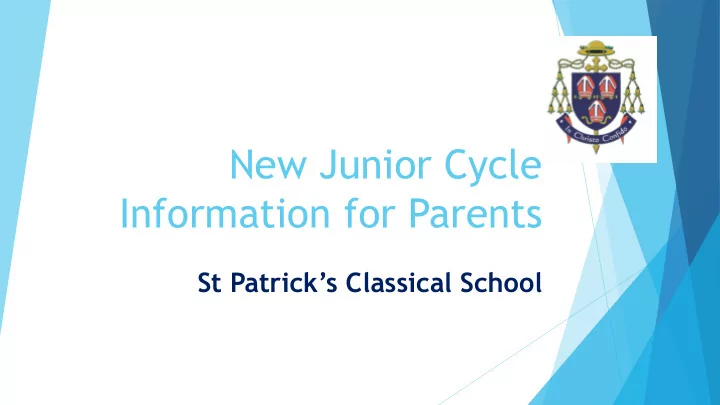

New Junior Cycle Information for Parents S t Patrick’s Classical School
Contents of this Presentation Why change is needed in Junior Cycle • What will be different? • • Key Skills and Statements of Learning • Curriculum and Assessment Wellbeing •
Why Change? ESRI research Many students are turned off learning in Junior Cert The JC exam is dominating teaching and learning in many Irish classrooms There is too much emphasis on covering content The world has changed There is a narrow range of assessment activity - lots of tests!
What will be different for your child? Smoother transition from primary to post-primary • More actively involved in their learning • Investigative approaches rather than being told • Greater emphasis on literacy, numeracy and the key skills • Assessment – nearer in time and place to the learning • Improved feedback and reporting to parents/guardians •
Your son will be involved in: • Reviewing feedback and identifying what they have done well • Identifying what to do next • Setting and achieving personal goals • Redrafting and correcting their own work • Giving feedback to others • Considering examples of good work and identifying how they can improve on their own work
New Junior Cycle (NJC) 8 Key Skills to be taught by all teachers in all subjects and Short Courses Should be included in all subject planning documents – already explicit in new Subject & Short Course Specifications If you are teaching an old syllabus, you are still required to teach Key Skills
24 Statements of Learning (SoL) A subject will only be able to cover some of these Statements Subjects with a new Specification show which statements are covered but if you are using an old Note: There are 12 other syllabus …… . SoLs. These are the 24 Learning Outcomes that your curriculum must be able to provide for all students
The New Curriculum English, Irish & Min 240 Hours Maths Other Subjects Min 200 Hrs Level 2 PLUs Min 250 Hrs Short Courses Approx 100 Hrs 300 hours, rising to Wellbeing 400 hours in 2019
Maths, English & Irish will have HL and OL. All other subjects and Short 10 subjects Courses examined at Common Level While there is no limit on the number of subjects a 9 Subjects and 2 Short student may study, he/she Courses can be assessed in a maximum of: 8 Subjects and 4 Short Courses
Changes in Student Assessment The The CBA in students 3 rd Year will Each will receive subject will The results be followed The results of the results have two Each CBA that are by an the CBAs will of the CBAs, one at will be communicated Assessment be terminal the end of followed by to the students Task (AT), 2 nd Year and communicated exam a Subject will be which will to students the other Learning formative, be (which and parents And Review forwarded before giving a clear includes and a record Christmas in (SLAR) outline of how to the State the AT) in kept in the 3 rd Year. SC meeting improvements Exams mid- school. have 1 CBA can be made Commission September only. (SEC) in from the June SEC
Student Assessment 2. In Sept/Oct/Nov, the school will upload This data will be added to the SEC results and a final cert – Junior Cycle the data it holds on each of the students through the Post-Primary Profile of Achievement (JCPA) will Online Database (P-POD) issue to the student by Christmas Short Courses, if Priority Learning Other Areas of Each CBA Learning any Units, if any
Grades CBA Junior Cycle • Distinction 90-100% Exceptional • • Higher Merit 75 – 89% Above expectations • In line with expectations • • Merit 55 – 74% Yet to meet expectations • • Achieved 40 – 54% Grades in CBAs are awarded based • Partially Achieved 20 – 39% on Features of Quality and following a SLAR meeting. There are no corresponding marks. • Not Graded Less than 20%
JCPA
Classroom Based Assessment (CBA) & Subject Learning And Review (SLAR) Requirements 2018/19 Assessment Task + Final exam = grade on JCPA. Results of CBAs reported to parents during during NJC and in JCPA. Should replace summer and Christmas tests in these subjects. CBAs at common level.
Phased Introduction of Subjects/Courses Year Subject/Course JCPA 2014 English 2017 2016 Science & Business 2019 Studies 2017 Gaeilge, MFL, Art, 2020 Wellbeing 2018 Maths, Music, History, 2021 Geography 2019 Technology Subjects, RE, 2022 Classics, Jewish Studies
Wellbeing a new area of focus: SECOND and THIRD YEARS access Wellbeing through… • Physical Education • Social, Personal and Health Education (including Relationship and Sexuality Education) • Civic, Social and Political Education • Guidance/ Wellbeing Class in 3 rd Year • School Pastoral Care System • Clubs/sports • Study Skills • Wellbeing Week and much more.
Wellbeing – Key Points Every teacher has a role 300 hours, rising to 400 hours Every school required to publish a Wellbeing Programme this year, based on inputs from students, staff and parents Includes PE, SPHE, CSPE and an element of Guidance May include aspects of other subjects but, if so, a rationale must be produced (using Appendix I from the Guidelines)
More Information? www.jct.ie www.curriculumonline.ie www.ncca.ie
Recommend
More recommend